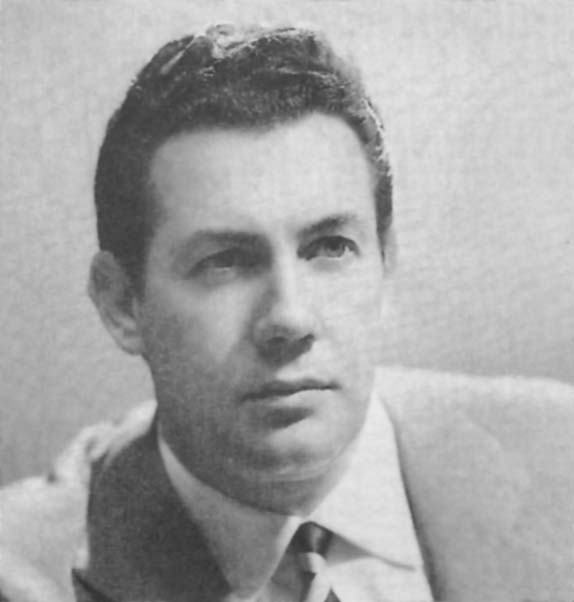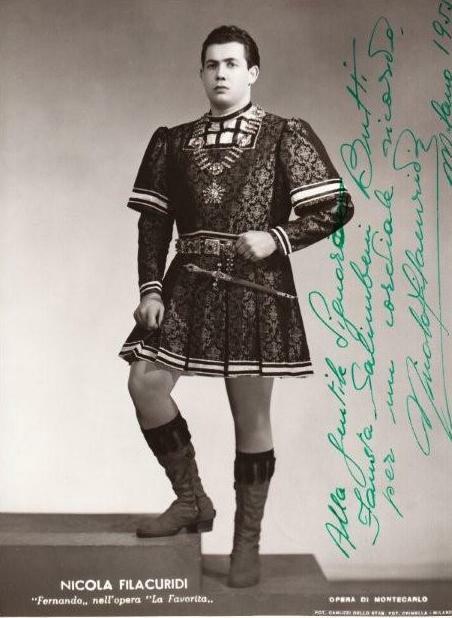Nicola Filacuridi was born in Alexandria, Egypt, of Greek parents in 1920. After local vocal studies, he made his operatic debut
in Alexandria in 1945 as Turiddu in Cavalleria rusticana. He later sang the same role at the Cairo Opera House, as well as Rodolfo
in La bohème and Cavaradossi in Tosca. In the opera chorus in Egypt was a young soprano, Violetta Wirth, with whom Nicola
fell in love. They married in 1946 and remained in love for the next 62 years. Early in 1947, Filacuridi decided to further his
vocal studies in Italy with teacher and conductor Federico Del Cupolo, and made his Italian debut as Alfredo in La traviata in
Savona in the 1948/49 season.
The following year, he appeared at the Rome Opera as Maurizio in Adriana Lecouvreur. He then sang at all the major opera houses of
Italy: Trieste, Venice, Parma, Turin, Florence, Naples, etc.
He visited Brazil in August 1950 singing at the Teatro Municipal in Rio de Janeiro with an Italian touring company that also
included tenors Mario Del Monaco, Ferruccio Tagliavini and Gianni Poggi.
He made his Scala debut in 1953, in a contemporary work "Leonore 40/45" by Rolf Liebermann, and took part in the premiere of the
"Dialogues des carmélites" in 1957. He also sang in Paul Hindemith's "Mathis der Maler" in 1958.
He began making guest appearances outside Italy, at the Monte Carlo Opéra, at La Monnaie in Brussels, the Vienna State
Opera, the Royal Opera House in London (1956), and the festivals of Aix-en-Provence and Glyndebourne (1960). He also appeared in
Spain and Portugal (Teatro São Carlos in Lisbon: 1952/1953; 1953/1954 and 1955/1956).
In 1958 he appeared at the Dallas Opera, first as Alfredo in La traviata with Maria Callas as Violetta. In the same season he
sang Lindoro in L'italiana in Algeri with Teresa Berganza. Both operas were directed by Franco Zeffirelli.
In 1960 he partnered Joan Sutherland in her first appearance in I puritani at Glyndebourne, and they later sang together in the
same opera in Genova. In 1961 he again appeared in Dallas, as Rodolfo in La bohème, with Ilva Ligabue as Mimì. His
final performance in Dallas was in 1963 when he sang Don José to Regina Resnik's Carmen.
From 1952 to 1961 he was very active singing on the Italian radio and television (RAI), appearing notably in productions of
"Resurrezione" (Franco Alfano) in 1952 opposite Carla Gavazzi, "La traviata" (1954) opposite Rosanna Carteri and Carlo Tagliabue,
"Adriana Lecouvreur" (1955) opposite Marcella Pobbe and Fedora Barbieri, "Manon" (1955) opposite Rosanna Carteri, "Un ballo in
maschera" (1956) opposite Marcella Pobbe, Lucia Danieli and Rolando Panerai, "Lucia di Lammermoor" (1959) opposite Anna Moffo and
Dino Dondi, "La traviata" (1960) opposite Renata Scotto and Mario Sereni and "Kamennyj gost" (Il convitato di pietra, in Italian)
by Dargomyzhskij (1961) in the role of Don Giovanni opposite Laura Londi and Giuseppe Valdengo.
Filacuridi sang a wide range of roles (besides those already mentioned) in operas such as: Rigoletto, Les contes d'Hoffmann,
Louise, Werther, Idomeneo, and Lohengrin. He also created roles in contemporary works such as Il cappello di paglia di Firenze by
Nino Rota and La guerra by Renzo Rossellini. He sang some 65 roles throughout his career.
In 1963 Filacuridi became tired of the endless touring and, determined to spend more time with his family, decided to settle in
Australia, where Violetta had relatives. So with daughter Danila and son Loris, they came to Sydney.
In 1964 Filacuridi was engaged by the Elizabethan Theatre Trust Opera with Jean Madeira to appear in a new production of Carmen.
This was followed by a period in New Zealand, where he sang Pinkerton in Madama Butterfly, but these were his last operatic
performances for some years.
In 1968 the Elizabethan Theatre Opera Trust Company (now Opera Australia) was giving performances of Tosca with the Italian
soprano Antonietta Stella. Both Donald Smith and his understudy were ill.
Filacuridi was called and asked if he could help. "Give me a couple of hours," he said, "and I'll call you back." True to his word
he did and said, "It's ok, I've been through Tosca and the voice is all there. I can help you."
The following year he was called on again for Un ballo In maschera as two tenors were once again indisposed. He came and saved the
scheduled performances. In 1976 he came to the company's rescue once more by singing two performances as Don José to
Huguette Tourangeau's Carmen. He had always wanted to sing at the Sydney Opera House and this way finally got his wish.
One of the reasons that Filacuridi was able to help so readily was his extraordinary memory, said to be almost photographic, and
musicality. "If you have learned a role properly, it stays with you forever," he would say.
Afterwards, he worked mainly in clubs, singing a selection of popular arias and Neapolitan songs, advertised as "Nicola Filacuridi
– the voice that thrilled La Scala". He also appeared occasionally on Australian television, once partnering his daughter,
who was a member of the Claire Poole Singers, in a duet version of Funiculì, funiculà.
Unlike many an operatic tenor, he was also an extremely good-looking man and a fine actor.
In 1954 he was chosen to dubb Italian tenor Giuseppe Campora in the film version of "Madama Butterfly" with Kaoro Yachigusa
dubbing Italian soprano Orietta Moscucci. Several of his RAI performances were also filmed for the television.
Nicola Filacuridi died on 12 February 2009 at 88 years old. He was survived by Violetta, and Danila and Loris and their children.
Filacuridi's recorded legacy includes "Adriana Lecouvreur" for the Colosseum label, recorded in 1951 with Mafalda Favero, Elena
Nicolai and Luigi Borgonovo, and conducted by Federico Del Cupolo. The Melodram label issued his live performance of "Il furioso
nell'isola di Santo Domingo" by Donizetti.
For the Vox label, Filacuridi recorded an LP with highlights from "Carmen" with Jean Madeira and Michel Roux, and Pierre Dervaux
conducting.
His RAI performance of "La traviata" with Carteri (1954) was also available on video.
Juan Dzazópulos, February 2008

